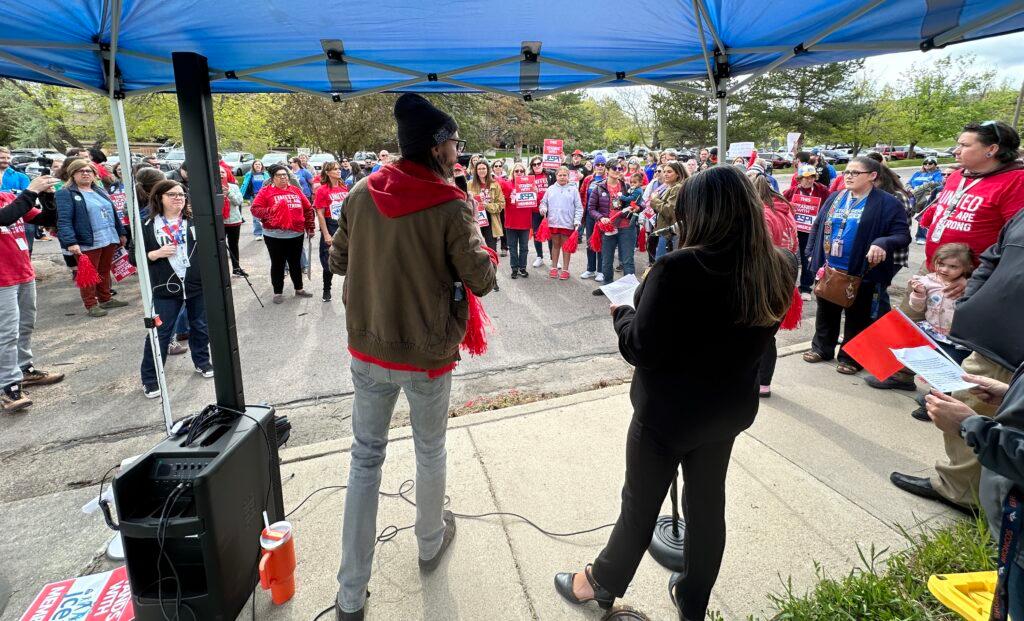
Are children with special needs safe in a classroom short on classroom aides? Are they safe getting to school in a HopSkipDrive car contracted by the district? Should school children be allowed to purchase a bag of Doritos for lunch?
The union representing bus drivers, cafeteria workers, classroom aides and custodians in Jefferson County says no. It wants better staff ratios, an end to outsourcing, healthier food in cafeterias, and a higher wage.
The district, meanwhile, said the issue is more complicated.
“Rarely is anything black or white,” said Kimberly Mahugh, the district’s associate chief of communications and strategic partnerships." There's typically a lot of nuance and other pieces of the puzzle.”
Who has the power to decide whether outsourcing of jobs and safe staffing levels fall within the collective bargaining agreement -- or within the district’s right to manage schools – is at the core of an impasse in contract negotiations declared last month. A mediator will now help the two sides find a resolution.
Thursday, 100 union members in red shirts made their demands known outside district headquarters where the school board was meeting. They chanted, “What do we want? Respect! When do we want it? Now!” They were joined by a group of placard-waving teachers who were heading into their own bargaining session.
“There has been a deliberate and sustained effort to refuse to negotiate our priorities,” said Zander Kaschub, president of the Jeffco Education Support Professionals Association. “This directly undermines the safety and success of our students. Our work environments are their learning environments and if we are not respected at work, our students are the ones that are suffering the most.”
The union represents 3,800 support professionals across 150 job types in the county.
Outsourcing
Jeffco has a shortage of bus drivers and bus assistants. Like other Colorado school districts, it has had to rely on rideshare companies, particularly for students with disabilities or who are homeless who have the right to free transportation under federal law.
The union wants an end to outsourcing using public dollars for private businesses like HopSkipDrive. It says staff have witnessed rides not arriving on time, drivers getting lost, and different adults every time.
The district says ending outsourcing isn’t possible.
“While we would very much like to be able to hire internally for every position that we have within our district, that's just not operationally possible,” said Matt Palaoro, chief student success officer and a district negotiations team member.
He said there are students with disabilities who require more support than the district can provide.
“While we ultimately try to hire enough bus drivers and aids to accommodate all of those specialized transportation requests, it’s not always possible,” said Palaoro.
Trevor Bryne, a bus driver and head of the transportation union, said outsourced drivers are untrained to handle medical needs of students.
“I'm trained in CPR, first aid, and seizure training for all my individual students,” he said.
Bus safety
The union says a shortage of bus assistants is leading to unsafe conditions on multiple routes. A bus driver, who had asked for an assistant to be on the bus multiple times, was assaulted by a student in February.
The union alleges that the district’s position posts are part of the problem. In a complaint filed with the state, the union alleges that the district has omitted or misrepresented wage rates. It contends that the district has engaged in “deceptive practices” by advertising only for substitute positions when higher paid permanent positions are available.
The district denies that job postings are inaccurate. It said safety is a top priority.
“We have continued to prioritize available bus aides on routes that need specialized support,” said Palaoro.

Staffing ratios inside schools
Classroom aides, known as paraeducators, are a critical part of many classrooms, especially for children with special needs. There are about 150 paraeducator vacancies currently.
Eileen Wahlmeier, a paraeducator in a special needs classroom, recalls an incident when her school went on lockdown. She sprang to action, attempting to move a non-verbal student who was much bigger than her to back to the classroom — about 100 feet — all the while scared that there was a shooter in the building.
“During that situation all I could think about is how understaffed we were and how the three of us (paraeducators) were going to protect and get eight high-need students to safety.”
Because of vacancies, support staff are often asked to fill in for other positions. The union wants extra duty pay – 20 percent of the guest teacher rate per hour – for employees who are directed to cover staff shortages outside their job classification.
The union says the district is using the vacancies to justify increasing the use of contractors. The district said some students require highly specialized staff, like a board-certified behavioral analyst or registered behavioral technician, that in some instances, they need to contract for outside.
Wages and benefits
On wages, the union has proposed a $5 per hour increase to base pay in all jobs (a 20 percent increase on average), while the district has offered 3 percent (ranging from about $0.67 to a little more than a dollar an hour more.) The union’s Kaschub said Jeffco support staff are the lowest paid in the metro area.
“Bus drivers in Jeffco, we're 10 out of 10 when it comes to metro districts in pay,” he said. “That's why we're asking for what we're asking for. When you look at what it costs workers to live and eat and just have a life in Jeffco, we are at the bottom of the barrel.”
He said staff leave to earn more in surrounding districts.
The district said it’s committed to bringing workers to a wage more in line with surrounding districts and increasing wages for the lowest paid employees. Over the last three years, wages increased 9.6 percent, 12.1 percent, and 8.6 percent.
“These are very significant investments that the district has made,” said Mahugh.
But with the rapidly rising cost of living, Jeffco workers say they’re falling further behind.
“I'm now depending on my disabled daughter and her volunteer work at the food bank to put food on my table,” said Nikki Saunders, a health aide. “I can't afford to put food on my table. That does not make me proud....We all deserve to thrive.”
As for the union’s proposal of a $5 an hour increase, the district says it isn’t financially viable, especially in an era of declining enrollment.
“Committing more than we're able to provide in an ongoing manner would not be a good steward of taxpayer dollars,” said Mahugh.
Jefferson County falls well behind several Front Range districts in the amount of additional funding local voters have approved.
The two sides are also divided on health benefits. The union wants the district to pay a percentage of insurance premiums. The district has proposed continuing with a flat contribution per employee, increasing it $300.

Healthy food
The union proposes expanding a healthy food pilot program that replaces unhealthy snack food and highly processed prepackaged food with healthier, scratch-cooked options. The district is proposing striking the pilot from the collective bargaining agreement and not expanding it to more schools.
Parents and a coalition of advocates have echoed the union’s call to phase out the sale of junk food, which the district calls “a la carte” or “smart snack” options. In elementary schools, those might be triple chocolate filled cookies and a cherry soda drink called Switch.
“We’re feeding them frozen, processed food that you can get yourself in the freezer,” said Martha English, a veteran kitchen manager. “It’s not like when we went to school and the lunch ladies made everything from scratch. Now we reheat things… I think the children deserve a lot better.”
The district said the a la carte snacks follow USDA nutritional guidelines.
“Families have the ability to limit and control their students' a la carte purchases,” said Mahugh.
There is no date set yet for mediation.









